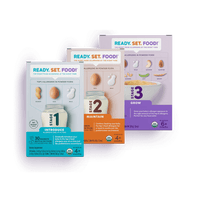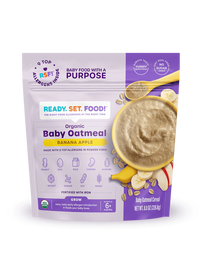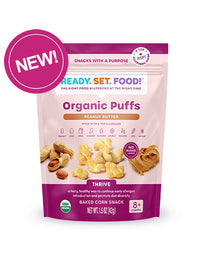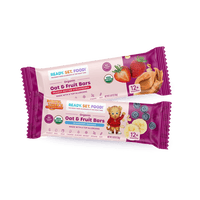August is National Breastfeeding Month and here at Ready. Set. Food!, we support each and every parent’s decision on how to feed and nourish their families.That’s why we’re proud to join National Breastfeeding Month in helping build a landscape of breastfeeding support with our new Breastfeeding 101 series. In this article, learn 6 of the best and most common breastfeeding positions (including the football hold, cross-cradle hold, and side-lying position) to help yourself and your baby get comfortable and promote successful feedings.
Finding the right breastfeeding position is essential to maximize comfort for you and your baby. It helps promote the proper latch. And since positioning's key for baby to effectively remove milk, the right positioning helps prevent problems like nipple soreness, engorgement and mastitis.
Sometimes, it takes a lot of trial and error before you find the best position for you both. But with practice, you and baby will find the best position and will naturally settle in!
Here are some of the most common breastfeeding positions for moms. But first, let's go over the essentials for getting baby and yourself comfortable --- in any position.
Essential Positioning Steps (For all Breastfeeding Positions)
- Position baby so their whole body is facing the breast.
- Their ear, shoulder and hip should form a straight line.
- Their stomach should be facing your body.
- Baby's head should not be turned to the side. Instead, it must be straight in line with their body.
- Make sure that baby's spine, head and neck are not twisted.
- Keep your back straight and bring baby to the breast.
- Do not hunch over baby, and do not try to force your breast into baby’s mouth. Hunching can make it difficult for baby to latch.
- Make sure baby is well-supported.
- If needed, use a pillow or nursing pillow to elevate baby, so it's easier to position and support them.
- Make sure baby’s body is close enough to your breast, so they don’t pull on your nipple while feeding.
- Support your back or arms with pillows, rolled towels or cushions to keep yourself comfortable, as needed.
- Once baby is positioned and starts to feed, make sure they're latching onto your breast properly.
- If you're struggling with finding the right position, or you think baby isn't latching properly, talk to a lactation consultant.
The Mom Team at Texas Department of State Health Services demonstrates some of the common breastfeeding positions:
Now, let's go over some of the most common breastfeeding positions.

Laid-back nursing position
The laid-back position is often associated with newborns. This is because, if you place your newborn baby on your chest or stomach while you’re lying down or reclining, they’ll naturally crawl to your breast and latch on.
But laid-back breastfeeding can work well for babies of any age, especially if your let-down is more forceful or your baby doesn’t want you to touch their head during feeding.
- Set up pillows on a bed or couch so they can support you while you recline
- Lean back and recline gently on the bed or couch, supported by the pillows.
- Position baby with their stomach on your stomach, and their head near your breast.
- Baby can settle in any direction as long as the front of their body is against yours and they’re close enough to reach your breast.
- Gravity will help aid baby’s latch and keep baby in place.
- Support baby’s head with your elbow, and support baby’s back with your forearm.
- Once baby has settled, lie back, relax and let them feed for as long as they need.
Cradle hold
This is one of the most popular breastfeeding positions, but it doesn’t offer as much support. So, it may be difficult to use with a newborn who is still learning to latch. But once your baby knows how to latch, it’s a comfortable option.
- On the side you want to breastfeed, position baby’s head and neck in the bend of your elbow.
- Use your forearm and hand on the same side to support the rest of baby’s body.
- Keep baby’s stomach against your body.
- If needed, use a pillow behind you and a second pillow (or breastfeeding pillow) to prop up baby, give you more support, and keep you from straining your shoulders and back.
- Just make sure that the propping pillow doesn’t lift baby so high that your breasts end up above natural resting height. Keeping your breasts at their natural height will help prevent latch straining and sore nipples.
- Prepare to help baby latch with your free hand.
- Cup your breast and put your thumb directly above the nipple and areola, where baby’s nose will meet the breast.
- Put your index finger below the nipple and areola, where baby’s chin will meet the breast.
- Lightly compress your breast and point the nipple towards baby’s nose. Then, let baby latch on.
- Once baby has latched, you can support their lower body with your other hand and forearm (if you aren’t already using a pillow for support.
Cross-cradle hold (Crossover hold)
This is similar to the cradle hold, but your hands will be in opposite positions. It provides more support than the cradle hold.
And since it’s easier to see baby’s mouth and your nipple, it’s a good option for babies who are still learning or struggling to latch (including newborns and preemies.
- Hold baby’s head with the hand on the opposite side of the breast you’re feeding baby from (if you’re feeding on the left side, use your right hand, and vice versa.)
- Your wrist should be between baby’s shoulder blades, your thumb should be behind one of baby’s ears, and your other fingers should be behind their other ear. This will support baby’s head and neck.
- Let baby’s body lie along the forearm that you’re holding their head with, for support on the rest of the body.
- Keep baby’s stomach against your body.
- If needed, use a pillow or nursing pillow to prop up baby and further support them.
- Prepare to help baby latch with your free hand (this time, that’s the hand nearest the breast).
- Cup your breast and put your thumb directly above the nipple and areola, where baby’s nose will meet the breast.
- Put your index finger below the nipple and areola, where baby’s chin will meet the breast.
- Lightly compress your breast and point the nipple towards baby’s nose. Then, let baby latch on.
- Once baby has latched, you can further support their body by placing your other hand and forearm around them (if needed).
Football hold (Clutch hold)
This position works well for moms who have had C-sections, moms with larger breasts, and premature or otherwise smaller babies.
It helps you see baby’s mouth and your nipples (to aid latching), provides plenty of support, and holds baby close to you for added comfort and bonding.
And if you’re breastfeeding twins or multiples, check out our previous article that explains the double football hold. This variation on the football hold lets you support and feed two babies at once.
- Position baby at your side and under your arm, on the side you’d like to nurse from.
- Baby should be facing you.
- Their legs should go under your arm (just like how you’d hold a football), so their legs face the bed, couch, or chair. Hold baby snug.
- Support your baby’s head with the hand from the same arm, and let their body rest along that forearm for support.
- Use a pillow or nursing pillow under baby for further support.
- Make sure baby’s chin touches the lower part of your breast as they prepare to latch.
- Use your free hand to cup your breast and help baby latch, just like you would with the cradle hold or cross-cradle hold.
Side-lying position
Do you need to breastfeed in the middle of the night and want to keep lying down on your bed? The side-lying position is a good fit.
- Lie down on your side.
- Have your baby lie down on their side next to you, stomach to stomach.
- If needed, use the hand on the side you aren’t lying on to cup your breast and assist with the latch.
- If needed, support baby with your hand and forearm.
Upright hold (Koala hold)
Since baby stays upright in this position, it’s a good option for babies with reflux or colic. It’s also beneficial for babies with a low muscle tone (such as babies who have Down syndrome) and babies with tongue-tie. And it works well for moms with a strong let-down or an overabundant milk supply.
However, this is usually a difficult position for younger babies because their body and head need lots of support. It’s better for older babies who have strong head and neck control.
- Sit baby up so they straddle your hip or thigh, with their stomach facing your body. Keep their head and spine upright.
- To prepare baby to latch, position baby’s head slightly below your breast, and have their head tilt back during the latching.
- While giving them adequate support, cup the breast and assist with the latch, just like you would with the football hold, cradle hold, or cross-cradle hold.
- Take care to support baby’s body and head as they sit, especially if they’re younger and still learning to sit and keep their head upright.

New Study Shows That Infant Anaphylaxis Usually Resolves With One Epinephrine Dose
A recent study has shown that, when infants experience severe aller...

Pregnancy Nutrition: What To Eat In The First Trimester
What to eat in the first trimester that will nourish your body, pro...

Formula Feeding Amounts: How Much Formula Should You Feed Baby Per Day?
How much formula should baby drink per day? It depends on their age...

What Baby Eats In A Day: 6-12 Months Old
Looking for ideas of what to feed your 6-12 month old little one? H...
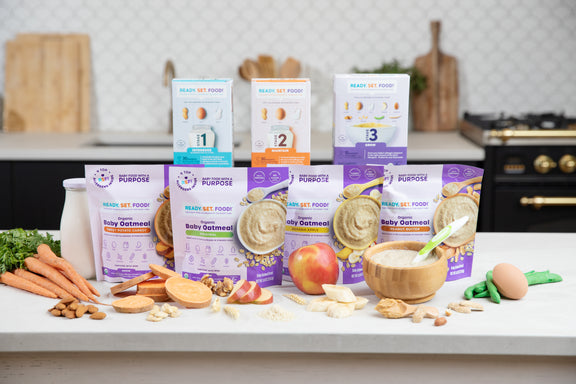
What To Look For When Choosing An Early Allergen Introduction Solution
Medical guidelines recommend early allergen introduction – the earl...
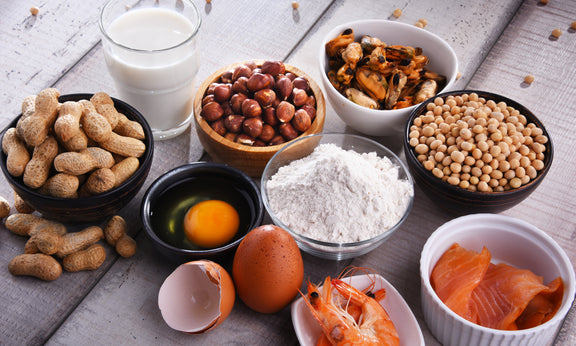
Why are food allergies on the rise?
Food allergies significantly affect families’ quality of life. Why ...
All health-related content on this website is for informational purposes only and does not create a doctor-patient relationship. Always seek the advice of your own pediatrician in connection with any questions regarding your baby’s health.
These statements have not been evaluated by the Food and Drug Administration. Products are not intended to diagnose, treat, cure or prevent any disease. If your infant has severe eczema, check with your infant’s healthcare provider before feeding foods containing ground peanuts.
